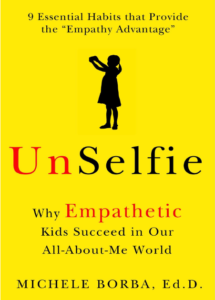Join the #UnSelfie Revolution to Raise Kids with Empathy, Moral Conviction and Courage To Make a Better World
Kaila D. is not yet four, but the young girl from San Diego already has the makings of an empathetic child. When I banged my toe at a party, the three-year-old was the first to my side. I watched her size things up, look carefully at my “injury,” and then empathize. Her face switched from inquisitiveness to concern, and then she looked up with the biggest eyes, and said, “I sorry ’bout your toe. You need Band-Aid for your owie? I help you.”
The preschooler may have missed a few words, but her message was clearly empathetic. And it was all because her parents were raising her to care and had taught her how to help even at a young age.
Empathetic, kind-hearted children regardless of age—are raised to care by their parents. While we may be producing a smart, self-assured generation of young people, today’s kids are also the most self-centered and stressed-out on record.
REALITY CHECK: Teens are now 40 percent lower in empathy levels than three decades ago, and in the same period, narcissism has increased 58 percent.
Producing caring, happy, and successful people will require a major change in child-rearing and teaching, one that applies proven strategies to our parenting. The good news is that empathy and kindness can be nurtured and the best ways to do so are always spontaneous, simple and don’t cost a dime. And those practices are always fueled by adults who want children to become successful, happy and caring. But there’s something else to keep in mind:
If we really want our children become caring people we must show them ways to respond to another’s concerns, distress, frustrations or sorrow. It’s our best tactic to keep their empathy capacities open, and avoid the infamous Empathy Gap.
Here are eight parenting strategies that help raise caring children from my latest book, UnSelfie: Why Empathetic Kids Succeed In Our All-About-Me World. All of these empathy-builders can be used anytime and anyplace.
1. Look Face-to-Face
Eye contact is how kids learn to read people’s emotions. And emotional literacy is the gateway to empathy. So face your child and be at eye level when you communicate so he or she can read your face.
A simple way to increase face to face connection is to enforce one habit: “Always look at the color of the talker’s eyes.”
The simple rule helps kids use eye contact and pick up facial expressions, voice tone, and emotional cues.
And while you’re at it, insist on setting “unplugged sacred times” where all family members put down those digital devices and engage in meaningful conversations with one another or just acknowledge one another’s presence!
2. Use More Emotion Words
Empathetic children tune into emotions. So talk about emotions more with your children and give them permission to show and convey their feelings.
Just use emotions naturally. Expand your children’s “feeling vocabulary” gradually so they can recognize and understand an array of emotion terms and use them in context.
3. Praise Caring Actions
A study found that praising children’s character traits rather than their behavior helped them internalize caring as part of their identities.The character-praised kids were also more likely to be more generous than those children who were told that they had donated because they were expected to do.
So use labels that stress your child’s character when deserved.
“You’re the kind of person who likes to help other people.” Or “You are a considerate and helpful person.”
4. Use Discipline to Redo Uncaring Behavior
Help your child “redo” an uncaring action by role-playing a behavior that considers the other person’s feelings. After all, empathy is always about WE, not ME.
“Let’s do that over and say what your friend might want to hear.”
“Try again, but this time, think about how your team would feel if their teammate put you down.”
“Start over and ask me in a way that makes my feelings not hurt.”
5. Capture Caring Moments
We’re often quick to snap photos of our kids’ academic successes, athletic prowess, or cute looks. But those shutter clicks convey to children that those images bring us the most pride. Make sure to display prominently photos of your kids engaged in kind and thoughtful endeavors so they recognize that “caring matters.”
Also let your kids overhear (without them thinking they’re supposed to) you describing those qualities to others as well. The technique is called “Earshot Praise.”
“I’m so proud of my son. He always thinks about how others feel.”
“I can always count on my daughter to be kind and caring.”
6. Use Real Events, Books, and News
 Help stretch your child’s perspective-taking skills (the cognitive part of empathy) using spontaneous everyday moments.
Help stretch your child’s perspective-taking skills (the cognitive part of empathy) using spontaneous everyday moments.
In books: “Take the bears’ side. How would you feel if Goldilocks used your beds and chairs without asking?”
In the news: “The cyclone destroyed most of those children’s homes. What do you think those kids are feeling and thinking?. What do you think we can do to help?”
In your family: “How does Dad feel hearing that his mom is so sick?” Don’t overlook asking: “I wonder if there’s a way we can help?”
7. Be a Caring Role Model
What you do in those ordinary moments may be powerful images for your children to copy and adopt for their own actions.
One of the greatest questions to ask yourself each day is: “If I were the only example my child had to learn kindness and empathy, what did she learn today?”
Look for simple ways for your child to see you extend kindness like offering your seat to an elderly person, phoning your friend who is down, asking someone how she is feeling. And be sure to tell your child how good it made you feel!
The more kids witness or experience what it feels like to be a “kindness giver,” the more likely they will incorporate the virtue as part of their character. And the more likely their empathy will be activated.
8.Reflect On Kindness
Just asking more questions that elicit your children’s thoughts, feelings, and experiences can boost empathy. So instead of always asking, “What did you learn today?” or “What grade did you get?” include:
“What’s something you did that was kind?” “What kind thing did you see someone do?”
The simple tweak in our messages helps kids start looking for kindness and reflecting upon the virtue-and be more likely to adopt it for themselves.
Our children are hard-wired to care, but their capacity for empathy must be nurtured. Doing so is what will help us raise good, quality people.
Best!
Michele
My latest book is UnSelfie: Why Empathetic Kids Succeed in Our All-About-Me World. It took me ten years of research and flying the world to find the best ways for educators and parents to nurture empathy in our children. UnSelfie has the proven answers we can all use to raise good people. It is now available in audio, digital and hard copy on Amazon or any book store.
Let’s start an #UnSelfieRevolution to help our kids think WE-not ME, and put empathy, kindness, caring, and courage back on our child-rearing agendas.
Follow me on twitter @micheleborba and read my blog, Dr. Borba’s Reality Check where I’ll give you proven practices to produce a generation of strong, caring kids.



